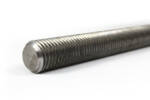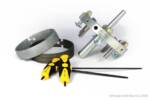Newest FAQs
In almost all cases, commercially available all thread rod will not meet F1554 grade 36. First, it is rare that distributors or manufacturers keep lot control on all thread rod. In other words, different heats of all thread rod are commingled so that it is difficult to determine the exact certification document that corresponds to... Read more

No, the SAE J429 specification only covers bolts up to and including 1½” diameter. SAE J429 (1999), the specification that includes Grade 2, 5, and 8 fasteners, states: “This SAE standard covers the mechanical and material requirements for inch-series steel bolts, screws, studs, SEMS, and U-bolts used for automotive and related industries in sizes to... Read more
In most cases, the strength of a given material used to make a fastener has strength requirements or parameters described as pounds per square inch (psi) or thousands of pounds per square inch (ksi). This is helpful when analyzing what grade of material should be used for a given application, but this doesn’t tell us... Read more
Yes. According to ASTM A563, the specification covering carbon and alloy steel nuts, the supplier may supply any higher strength nut at anytime, but the supplier must give notice to the purchaser that the substitution is being made. The supplier cannot supply a nut that is prohibited by the inquiry and resulting purchase order. “1.2... Read more
In theory, one could potentially carve out a groove that would be sufficient for fitting a shear plate or split ring. However the labor and ability to carve an exact fitting grove would be time consuming as well as tedious. All references to the proper installation of shear plates and split rings, such as the... Read more

ANSI/ASME B18.2.1 is the dimensional specification that covers hex bolts and square head bolts. Note 14 of the specification addresses reduced body material that is used in the roll threading process. “14. Reduced Diameter Body. Bolts may be obtained in “reduced diameter body.” Where “reduced diameter body” is specified, the body diameter may be reduced... Read more
There are a variety of different types of construction projects that require domestically manufactured (U.S.-made) products, including bolts. There are three main pieces of legislation that mandate “domestic” products. The American Recovery and Reinvestment Act of 2009 The American Recovery and Reinvestment Act of 2009, also known as “ARRA” or “Stimulus Plan,” was enacted into... Read more
Many manufacturers sell through distributors, who then stock those manufactured goods and sell to the end users of the product. Portland Bolt is a manufacturer, but does not work through these distribution channels. We primarily sell directly to contractors, steel fabricators, and other construction-related end users of the bolts that we manufacture. Due to the... Read more
It is known that the required grade of washer to be used with an A325 or A490 structural bolt is an ASTM F436 hardened washer, however whether or not a washer is required to be used in a given application is often brought into question. The purpose of using a flat washer with a bolt... Read more
Yes. Custom F436 washers can be manufactured to larger sizes per your job’s requirements. Portland Bolt has been involved in many projects where custom F436 washers were specifically called for on a job. However, ASTM F436 does not technically allow for custom sizes and only allows for very specific types and styles that conform to... Read more
